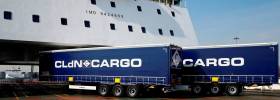Displaying items by tag: CldN RoRo Order More
CLdN Ro-Ro Continues to Expand with Pair of Newbuilds
#MoreOrders - CLdN Ro-Ro SA which operates between Dublin and northern European ports has now confirmed two more vessels have been ordered, with options for a further four, through the Croatian shipbuilder Uljanik.
The orders according to Multimodal, follow an ambitious fleet expansion programme announced last September by the Luxembourg based short-sea operator.
Currently CLdN RoRo SA operate 24 modern RoRo vessels, offering in excess of 100 sailings per week between the ports of Zeebrugge, Rotterdam, London, Killingholme, Dublin, Gothenburg, Esbjerg and Porto had previously announced its intention to add 12 new vessels to its fleet over the coming years.
CLdN, whose core services have traditionally been the Continent /UK, which commenced in December 1974, have steadily expanded their geographical presence into new markets, including Ireland, Sweden, Denmark and Portugal in recent years
The initial orders, being built at the Korean yard of Hyundai were described as ‘Game changers’ at the time of order, offering 8,000 lane meters of Ro-Ro capacity. The additional orders are of the same flexible and radical design and offer 5400 lane meters, to accommodate high utilisation of trailers, containers and automotive products in an efficient and environmentally friendly manner, being ‘’LNG ready’’ for straightforward conversion to LNG propulsion.
A company spokesperson described the additional orders as the ‘workhorses’ of the expanding fleet, as they have the durability and flexibility to operate on any of the network and offer complete interchangeability to cater for the demands of the differing trades.
The company sees this as giving a key advantage in this segment and allows it to adapt to customer demands or changing market conditions very rapidly.
These orders fit with CLdN's ambition to develop an additional 70% capacity over the next four years and the Ports Division, C.Ro Ports has now embarked on preparing Terminal infrastructure to be ready for the arrival of the new ships, which will commence delivery Quarter 3 2017.
























































